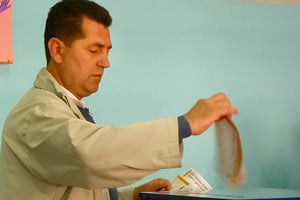
A voter casts his vote at a polling station in the city of Travnik during general elections in Bosnia and Herzegovina, 3 October 2010. (OSCE/Jens Eschenbaecher)
Earlier this month I served as a member of the US delegation to the election observation mission in Bosnia and Herzegovina (overseeing presidential, parliamentary and cantonal elections held on October 3). The observation was implemented by the Office for Democratic Institutions and Human Rights (ODHIR) of the Organization for Security and Cooperation in Europe (OSCE) and the official press release from the OSCE on the elections can be found here.
As I served on the observation team for the OSCE it is not appropriate for me to offer my personal views on the processes or politics of the elections. However, I think it is worth noting the ancillary benefits of having a observation team made up of many (if not all) of the OSCE member states. Over 200 people came to Bosnia and Herzegovina from across the OSCE states (as the OSCE says of itself, “[t]he OSCE is the world’s largest regional security organization whose 56 participating States span the geographical area from Vancouver to Vladivostok). The US delegation included employees of the State Department and many from outside government. Observers from other member states were employees of their respective ministries of foreign affairs and other government agencies (my team member, for example, was from the Spanish Ministry of Defense) but others came from non-governmental walks of life: journalists, researchers, writers, aid workers, and university types likes me. This diverse gathering of so many engaged and committed people offered the opportunity for them to act as citizen diplomats as they fanned out across the country. For many people in Bosnia and Herzegovina, the closest they will come to meeting an international representative is when an OSCE observer team visits their polling station on election day (this is true in any country). Accordingly, the mere presence of the observers is nearly as important as the information they collect. It also means that the observers must comport themselves in a professional and respectful manner – they must be selected, trained and briefed to that end. I am pleased to report that was certainly the case with my fellow observers and that the OSCE team in Sarajevo did an excellent job in emphasizing this in the briefings to the observers before election day.
The gathering of the entire group of observers in Sarajevo for briefings before the elections and a debriefing afterward also allowed for multilateral citizen diplomacy. Many observers know each other from previous missions and over time a community of interested and engaged observers has remained in touch and continue to share information and experiences, further enhancing their own skills as observers, their overall knowledge about complex elections and their ability to serve in this citizen diplomacy role (for those observers who aren’t professional diplomats). I also imagine that many of the observers have returned to their home countries with an understanding of Bosnia and Herzegovina they would not otherwise have – and they can share those experiences with their fellow citizens.
This version of track II diplomacy may not be the intended result of ODHIR’s election observations but it is certainly a positive outcome and supports broader goals of citizen engagement on many levels.